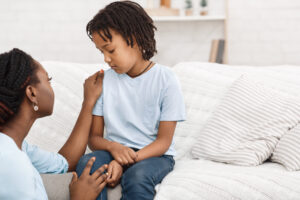
Conflict is an inevitable part of life, and we often are not taught how to repair harm once it occurs, especially not with our children. It is vital for parents and caregivers to remain in healthy connection with their child after conflict occurs, and to model what an effective repair conversation looks like. This not only strengthens the bond with your child, but it also teaches children the importance of apologizing and repairing harm when conflict occurs.
This article from The Peaceful Parent Institute details the ways the parent-child relationship heavily influences how your child engages in future relationships. Navigating conflict is a crucial aspect of healthy relationships. Here are a few relationship tools to explore and practice:
Regulate, regulate, regulate
Before attempting to engage in a repair conversation, calm yourself all the way down through self-regulation exercises, whether that be going for a walk, taking some deep breaths, or journaling about your feelings. Children are very perceptive, and attempting to have a repair conversation when you are still escalated about the harm that occurred will likely be felt by your child and lead to a more contentious conversation. Take all the time you need, and employ your self-regulation skills, to fully calm down before engaging in a repair conversation.
Own Your Part
Once you have calmed down, owning your part of the conflict without justifications or explanations is important. Name that you made a mistake and apologize to your child – even if the mistake was the tone or volume of your voice. Not only does this let your child know you care about their emotions, it also models accountability. It is rare that children receive an apology from an adult, especially a parent or caregiver, and that makes it all the more powerful.
Express Regret
Naming what you would’ve done differently during the conflict is a helpful way to model self-reflection. State what you would’ve done differently clearly and plainly, without putting it back on the child for their behavior. For example, “I apologize for yelling at you” lands much better than “I apologize for yelling at you but I wouldn’t have to yell if you just did your homework when I asked you to.” Keep it brief and specific.
Make a Plan for the Future
Working through conflict is a skill that takes practice. This article offers some steps for making a plan with your child about how you will both calm down when the next conflict arises. Prepare to handle it differently in the future to stay in a healthy relationship with your child.
Learning how to effectively apologize can be really difficult, so give yourself and your child grace throughout the learning process. After all, you are teaching invaluable life skills that will deeply impact the quality of friendships and relationships your child will have throughout their life. It takes time and effort, but learning to use these relationship tools is worth it in the long run.
